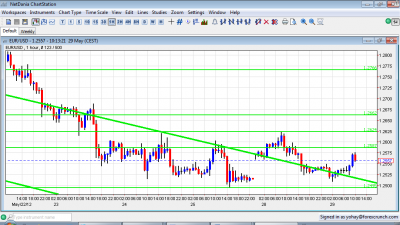Euro USD is trading at low levels just above critical support, after closing the weekend gap. Fears around Spain mount together with yields. After banks and regions were shut out of markets, the Spanish sovereign assumed responsibility and the markets don’t like it. In Greece, banks received 18 billion euros from the EFSF. This moves the focus away from the troubled nation, but also capital continues moving out of the country. Is the Grexit an irreversible process? Today we have some interesting US data.
Here’s an update on technicals, fundamentals and what’s going on in the markets.
EUR/USD Technicals
- Asian session: The pair continued lower and eventually closed the gap, staying above the 1.25 line. A surge began in the European session.
- Current range: 1.25 to 1.2587.
- Further levels in both directions: Below: 1.25, 1.24 and 1.2320.
- Above: 1.2587, 1.2623, 1.2660, 1.2760, 1.2814, 1.2873, 1.29, 1.2960, 1.30, 1.3050, 1.3110 and 1.3180.
- 1.2587 returns to its position as resistance, although the previous 2012 low of 1.2623 is far more important.
- 1.25 is a key support level.
Euro/Dollar down over concerns about Spanish banking sector- click on the graph to enlarge.
EUR/USD Fundamentals
- German CPI. Exp. -0.1%.
- 6:00 German Import Prices. Exp. -0.2%. Actual -0.5%.
- 13:00 US S&P/CS Composite-20 HPI. Exp. -2.7%.
- 14:00 US CB Consumer Confidence. Exp. 69.8 points. See how to trade this event with USD/JPY.
For more events and lines, see the Euro to dollar forecast
EUR/USD Sentiment
- Spain getting closer to bailout: Spanish officials deny the need for a bailout over and over again. The need to deny it so many times is worrying. So are Spanish bond yields which remain above 6% – unsustainable levels. The announced injection of 19 billion euros into Bankia, much more than announced only two weeks earlier, and the loss of market access of banks and regions (such as Catalonia) to the markets, mean more pressure on the sovereign. How long can Spain back all these entities without losing market access?
- Greek banks get 18 billion euros: The EFSF finally transferred money to Greece’s largest banks to help them keep up with ongoing pressure. This is supposed to lower the level of uncertainty and stop the outflow of cash from banks. There is room for doubt if this will really help. The Greek bank job continues.
- Greek polls swing to pro-bailout parties for now: Polls aren’t necessarily accurate, but they certainly have an impact. A swing towards pro-bailout parties in the last polls sure helped the euro recover. Greece imposed a ban on polls two weeks before the elections, so the markets will soon be in the darkness. See how to trade the Grexit with EUR/USD.
- Contingency plans for Grexit remain debated: The recent EU summit provided verbal support for Greece and a wish for the country to stay in the EZ. Nevertheless, contingency plans are in the works at central banks, big banks and everywhere else. These institutions don’t hide it anymore. French banks are among the most exposed to Greek debt, and several of them, including Credit Agricole, BNP Paribas and Societe Generale, have drawn up plans for a worst-case scenario. Talk of a Greek exit, which were taboo until recently, is now being discussed openly.
- Italy supports Eurobonds: Italian Prime Minister Mario Monti surprised the markets with his endorsement of joint eurobonds to help resolve the financial crisis. Monti joined French president Hollande against Germany on this issue. Germany is becoming more isolated in Europe, but eurobonds seem off the table. Italy needs eurobonds in order to lower funding costs for its fast-contracting economy.
- Germany releases weak data: Weak inflation numbers join previous weak data from the locomotive of the zone. The German Business Climate and Manufacturing PMI indicators were both below market forecast, and concerns are mounting that the reliable German economy may be sputtering. Further weak releases out of Germany could spell more trouble for the fragile euro.
- US Remains in the Shadows for Now: At least until Thursday, the US situaiton remains second fiddle to European events. Jobless claims have stabilized at around 370K and home sales were above market forecast. Nevertheless, the weakness in durable goods orders and other signs draw a mixed picture. The CB consumer confidence will get attention only if no big headlines are released in Europe at the same time.

